"The mighty avenger of evil offenses", or Field Marshal I.F. Paskevich
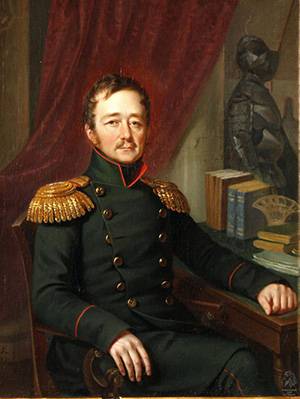
He was not without reason called the darling of fate - a native of the poor Little Russian nobility, he made a dizzying military career, rising to the count of dignity and the rank of field marshal. He enjoyed the almost absolute confidence of Nicholas I, who, while still a cesarevitch, respectfully called this man “the father-commander”. Having removed the military uniform only in old age and because of fatigue and injury, Ivan F. Paskevich was the brightest and in many ways unique portrait of the military elite of Russia of the Nikolaev era.
From the province to the capital
Ivan Paskevich lived an extremely eventful life, especially the military, life. She often made sharp turns, but it happened with the indispensable climb. Paskevich was born on May 8 1782 in Poltava in a family of poor Little Russian nobles. His father was the chairman of the Upper Zemstvo court, collegiate adviser Fedor Grigorievich Paskevich, all of whose fortune lay in about 500 serf souls on an estate located in the Poltava province. The Paskevich family was not distinguished by nobility, although their ancestors were associates of Bogdan Khmelnitsky. At the beginning of the 17th century, an Orthodox nobleman from Volyn Fyodor Tsaliy ass in the Poltava regiment. His son was nicknamed Pasko Tsaliy, and his grandson had already acquired the full name Paskevich. The mother of the future field marshal, Anna Osipovna Korobovskaya, was descended from Mogilev nobles and was born on lands belonging to the Rzecz Pospolita.
The boy already in childhood showed good abilities, mastered French and German. A big role in the fate of the young Paskevich was played by the decision of his grandfather, fully supported by his father, to send children to the capital in order to receive a decent education. Grandfather Grigory Ivanovich lived at that time in St. Petersburg and was well acquainted with the local order. In 1793, Ivan and his brother Stepan were brought to the capital and assigned to study in the Page Corps, which was not so much a military one as a court educational institution. Catherine's golden age was nearing completion, although no one had ever imagined this. The time of brilliant favorites and self-assured temporary workers, grandiose designs and loud victories - all this was soon to become history. This time has gone into the past, together with its stunning luxury and splendor of the court of the Empress, who could see Paskevich in his young years, and whom he later remembered with pleasure all his life.
Soon came the short, but very dynamic rule of Paul I. The young man came into the view of the new emperor. In the 1800 year, when only a few months remained before the release, Paskevich was appointed the sovereign's life page and showed himself well in this field - he was disciplined and performing, which was not hidden from the attention of Pavel Petrovich, who appreciated these qualities. At the end of the Corps of Pages, Ivan was assigned to the elite Preobrazhensky Regiment for the position of lieutenant. At the same time, he was also the aide-de-camp of the emperor. The guard, although in the most part Semenovsky, and not the Preobrazhensky regiment, was associated with the last palace coup, during which Paul I was killed. Paskevich never spread about these events, although he had nothing to do with them.
The beginning of military career
Alexander I, who succeeded his father on the throne, solemnly promised that with him everything would still be like “under grandmother”, and the tightly stretched disciplinary reins of the Pavlovian period were weakened. Using guards liberties, Paskevich, often visited his parents in Poltava - on a wave of euphoria that swept the military circles, got rid of numerous and strict regulations and instructions, they looked at it with the help of their fingers. True to the ideas of fighting Jacobin freethinking, Alexander I became an active participant in the Third Anti-French Coalition, finally formed in the spring of 1805. Russia was preparing to fight France, which had less and less revolutionary Jacobinism and more and more imperial pathos, reinforced by the strength and glory of the French weapons.
At the same time, Paskevich was assigned to the army of the general of Catherine’s times, Michelson, located on the western border between Brest-Litovsk and Grodno. This army, numbering more than 90 thousand people, was preparing to enter the borders of allied Russia of Austria. However, fate decreed that the high command was soon given to Mikhail Illutriovich Kutuzov. Michelson extremely painfully perceived such a decision, and the young Paskevich, eager to fight, often had to console the general who remained in Brest-Litovsk. But military achievements did not pass by Ivan, who was so eager for him - taking advantage of the succession of failures of Russian troops in Europe and the unraveled tangle of numerous contradictions, the Ottoman Empire, an old and persistent enemy, intensified its hostile activity against Russia.
In 1806, the next Russian-Turkish war began. The epicenter of the fighting was at the Danube Theater, where the old general was sent to the commander-in-chief. There Paskevich and met with this war. Ivan Fyodorovich was not a staff side-keeper collecting army rumors and gossip, glancing at his military colleagues with a hint of neglect. He was young, hot and eager for military glory. Mikhelson had a high opinion of his aide-de-camp - for his skilful actions during the blockade of Ishmael, already in 1806, Paskevich was awarded a golden sword with an inscription "For Bravery", and in 1807, during the night storming of Brailov, April 20 was hit in the head.
Russian-Turkish war 1806 – 1812 was characterized by regular changes of supreme commanders and intense diplomatic struggle, where the interests not only of the opposing sides — Russia and Turkey — but also of England and France intertwined intricately. As aide-de-camp, Paskevich had to visit the capital of the enemy Constantinople, where the conditions of a shaky and eventually ceased truce, as well as on the issue of prisoner exchange, were specified. He is growing rapidly in the ranks, and his uniform is decorated with all the new orders - the staff work is over, and now Paskevich is a real combat officer. It is noteworthy that the young officer kept a diary, the main place in which he devoted not so much to personal experiences as to the description of the hostilities. This diary of Paskevich led up to the Borodino battle, marked by its bloodshed.
In January, 1811 was appointed to command a brigade in Kiev consisting of two regiments, with the second regiment, Orlovsky, the core of which was the so-called garrison battalions with a large number of soldiers at fault, only to be formed. Being by that time a major general, he replaced a large number of officers with young and energetic graduates of the cadet corps. Without focusing too much on the footsteps, he focused his efforts on combat training, improving life and keeping his subordinates entrusted to him. All this was not easy for Ivan Fyodorovich - from excessive nervous overstrain, he fell ill and fell ill. Nevertheless, the command appreciated his merits.
Although the war with Turkey was coming to an end, relations with Napoleon were rapidly deteriorating - the shaky Tilsit peace and the Erfurt accords could no longer hold the “thunderstorm of the twelfth year” that was ready to break out. The Oryol regiment along with Nizhegorodsky was part of the brigade of the 26 th infantry division of the Raevsky. The army on the eve of the impending war was strengthened by new formations - just at the end of 1810 - the beginning of 1811. 15 was quickly formed by new infantry regiments and 4 Chasseurs. In January, Paskevich 1812 was appointed commander of the 26 Infantry Division, which was part of Bagration's 2 Army. At that time, he was the youngest divisional commander in the entire Russian army - only 11 years have passed since Paskevich left the Party Corps desk.
"... Young generals of their destinies"
In June, 1812, Napoleon crossed the Neman, and thousands of columns of the Great Army dusted along Russian roads. In early July, Bagration undertook a maneuver aimed at connecting with the 1 Army under the command of Barclay de Tolly. The 26 Division moved at the head of the column of the second army. She took an active part in the battle with the corps of Marshal Davout at Saltanovka near Mogilev. As a result of this battle, both Russian armies managed to successfully unite at Smolensk. At the 4 August Military Council, which was devoted to the city’s defense plan, Paskevich defended his vision of the situation, and N. N. Raevsky, commander of the 7 Corps, agreed with his arguments. The battle was decided not to give in front of Smolensk, but inside the city. During the bloody battle, the division of Paskevich successfully repelled the persistent attacks of the enemy under the command of Marshal Michel Ney, who personally led his soldiers to the attack on the Russian positions. Poles from Poniatowski’s corps, who traditionally suffered great losses in Smolensk, were also noted for their stubbornness. Subsequently, Paskevich, for his skillful actions, deserved the praise of Bagration and Barclay de Tolly.
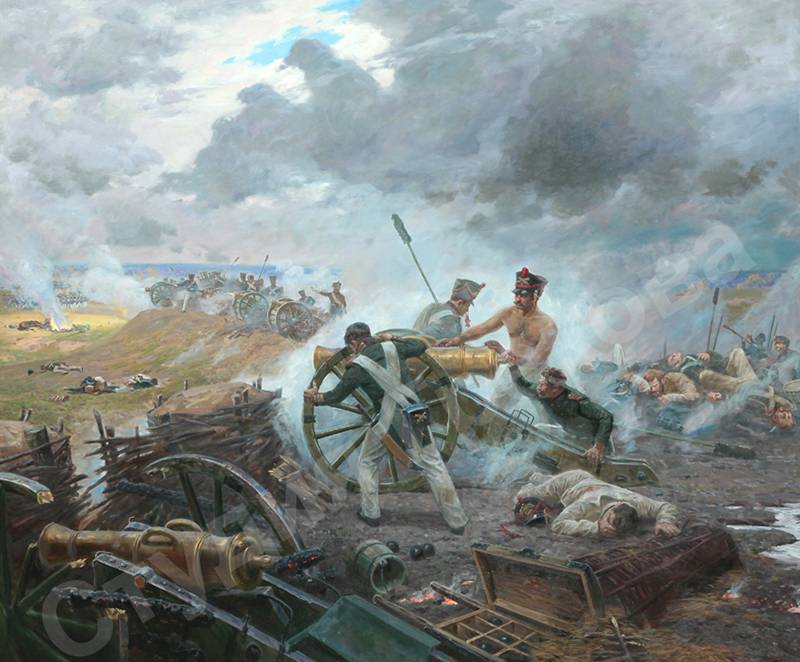
The next bright page in the biography of the young general was the Borodino battle, which produced the strongest impression on the participants and contemporaries. The division of Paskevich was defensive in one of the most critical areas, known as the Rajewski battery. It was there that the French troops of the Viceroy of Italy and the stepson Napoleon Eugene Beauharnais were hit. At the climax of the struggle for the battery of Rajewski, when, despite the hurricane fire of the Russian guns, the 30 th regiment under the command of General Bonami de Belfonten broke into position, Generals Kutaisov and Ermolov personally led the counterattack. Paskevich's soldiers also took part in it. During this battle near Ivan Fyodorovich, two horses were killed, but he himself did not even get a concussion.
After the bloody battle of Borodino, there was a retreat to Moscow, a Tarutinsky maneuver, and a clean-up division that had suffered a heavy loss. Due to the loss of personnel, many of its battalions had to be re-formed. Then new battles: Small Yaroslavl, Vyazma, Yelnya, Red. Paskevich had to take command of the 7 corps instead of the diseased Rajewski, and Europe was ahead. 27 January 1813 Paskevich received the keys to Warsaw from the deputies of the townspeople. Subsequently, fate will more than once reduce it to this city. The 26 Division was merged into the so-called Polish army under the command of L. L. Bennigsen and, in this form, took part in the Battle of the Nations under Leipzig. For the difference in this battle, Paskevich was promoted to lieutenant general.
At the final stage of the campaign, during the fighting in France, the 2-th Grenadier Division entrusted to it participated in a number of battles, including for Paris. Here in the life of Ivan Fedorovich again intervened case. At the review of the troops on the occasion of the capture of the enemy capital, Emperor Alexander I introduced him to his 18-year-old younger brother Nikolai Pavlovich, introducing Paskevich as one of his best generals. This fact later played an important role in the life of Ivan Fedorovich. Nikolai, who was always keenly interested in military affairs, asked Paskevich for a long time about the details of 1812, 1813 and 1814 campaigns, they talked for a long time and studied maps of military operations. Paul's widow Maria Feodorovna also showed favor with the general. It was at her insistence that Paskevich accompanied the youngest of the Grand Dukes, young Michael, during his trip abroad and in Russia.
The relationship with Nicholas gradually grew into a lasting friendship that lasted almost 40 years. The first years after World War II, Paskevich continued to command his 2 grenadier division, stationed in Smolensk. He did not hide his negative attitude towards such innovation as military settlements. In 1817, Mr .. Ivan finally got married to Elizabeth Alekseyevna Griboyedova, 22-year-old, who was her second cousin to the famous author of “Griefing the Mind”. They had four children - a son Fedor and three daughters.
Despite being close to the imperial family, and perhaps because of this, Paskevich could and was able to firmly defend his opinion and was not afraid to raise his voice even to Grand Duke Constantine, the emperor's younger brother. As governor of the Great Kingdom of Poland, Konstantin did not pay enough attention to the management of such a troubled and troubled region, concentrating on a detailed study of the characteristics of local women.
In May, the 1821 of Paskevich was appointed to command the 1 Guards Infantry Division. His immediate subordinate was the commander of the first brigade Grand Duke Mikhail Pavlovich. The second brigade was commanded by Nikolai who was friends with him. The situation in Europe was turbulent, and Alexander I ordered to push the guard closer to the western border. Russia was a member of the Holy Alliance of the three most powerful European continental monarchies, besides it there were Austria and Prussia. The emperor too idealized this very controversial alliance, according to which its charter Russia was obliged to assist its allies in the event of some kind of external or, more likely, internal shocks. During these field exits and maneuvers, Paskevich and Nikolai Pavlovich, who could not even imagine that the imperial throne was prepared for him, finally got close and until the end of their days the future tsar called Ivan Fedorovich the “father-commander”.
The political circumstances then changed, and Russia did not have to provide assistance to its Western "partners" at that moment. Paskevich returned to St. Petersburg, and in February 1825, with the appointment of his adjutant general, a rare rank at that time, he received the command of the 1 Army Corps with headquarters in Mitau, where he moved with his family. Here Ivan Fedorovich was struck by the news of Alexander I. I’s death in Taganrog. According to the rules of succession, the next emperor was Grand Duke Constantine, with whom Paskevich had, to put it mildly, strained relations. However, the governor of Poland did not want to shoulder the burden of responsibility for the management of the empire, because he was treated to state affairs with a certain degree of disgust. Soon he abdicated in favor of his younger brother, who became Emperor Nicholas I. This greatly influenced the further fate and career of Paskevich, given their long friendship by that time. After the December events on Senate Square, Paskevich was urgently summoned to the capital, where, as a confidant of the king, he headed the Supreme Court of the Decembrists. At the end of the trial of the attempted coup d'état, Paskevich was going to go to Moscow to participate in the forthcoming coronation, but the foreign policy circumstances made their inexorable amendment - taking advantage of some internal confusion in Russia, Persia began fighting against it. By order of Nikolai Pavlovich Paskevich appointed commander of the troops in the Caucasus.
Caucasus
Persia was a rather turbulent neighbor, although it could not be compared with another, much more hostile, Ottoman Empire. In Tehran, they could not calmly observe the expansion of Russian influence and territories in the Caucasus, the wounds from the old defeats inflicted by St. Petersburg. Not the last role was played by the British, who served not only as instructors in the Persian army rearming themselves in the European manner, but also occupied important posts of physicians in the Shah court of Feth Ali Shah and surrounded by the heir to the throne Abbas-Mirza. The Persians crossed the border without declaring war, knocking down weak barriers. The commander of the troops in the Caucasus by that time was a distinguished veteran of World War II, General Yermolov, who enjoys enormous prestige among the troops. The king treated him with a certain degree of mistrust, suspecting him of participating in the Decembrist plot. There were also very uneasy relations between Paskevich and Yermolov, since they had great differences even during the foreign campaign of the Russian army 1813 – 1814 abroad.
Ivan Fedorovich was sent to the Caucasus officially as deputy commander, but he had with him a letter from Nicholas I, in which the emperor, worrying about the state of health of Yermolov, made it unequivocally clear who was in charge now in the Caucasus. Paskevich arrived at the 1826 theater in August, and the old feud broke out with a new force. A conflict situation arose, for the resolution of which Adjutant-General Dibich was sent to the Caucasus. The latter unconditionally supported Paskevich, behaved somewhat provocatively towards Ermolov. In the end, in March, 1827 Yermolov was forced to resign.
However, this had no effect on the course of the war - the initial successes of the Persian troops, who used the element of surprise, had long ended. Back in September, 1826, barely arriving in the Caucasus already in the rank of General of Infantry, Paskevich defeated the enemy army at Elizavetpol, having 10 thousand people against 30 thousand. The Persian commander, heir to the throne, Abbas-Mirza, was forced to retreat into his territory. By the end of the year, the whole territory of the empire was cleared of the enemy. Regrouping forces and ensuring the uninterrupted supply of his army with everything necessary, Paskevich continued the offensive.
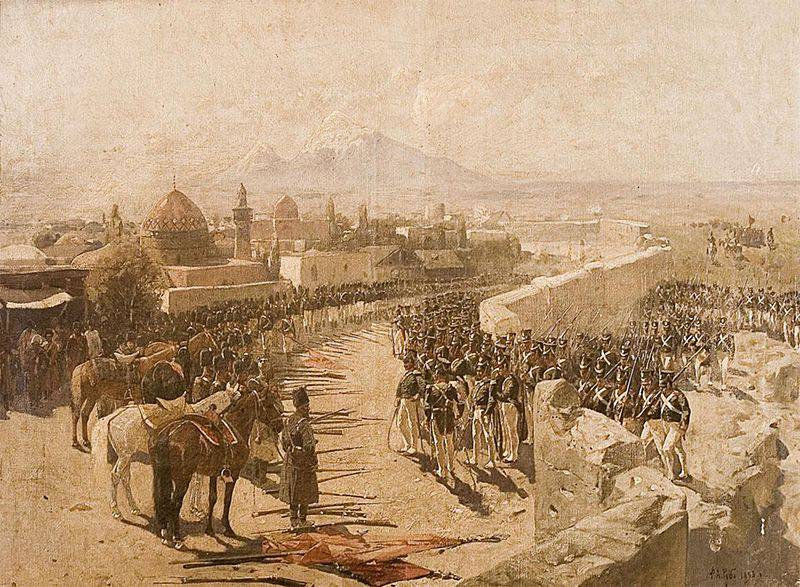
At the end of September 1827, the Russian troops approached the well-fortified and occupied by a strong garrison of Erivan. Having placed siege batteries around the city, the Russians subjected the Persian positions to massive bombardment. October 5 Erivan was taken. For this success, Paskevich was elevated to the county dignity with the title Erivansky and was awarded the Order of Saint George of the II degree. The Persians who received such a painful blow asked for peace, which 28 concluded on February 1828 in Turkmanchai. He was signed by Russian commander Paskevich and state councilor Alexander Obrezkov, and on the Persian side by the heir to the throne Abbas-Mirza. A prominent role in the preparation and signing of this agreement was played by the diplomat and relative of Paskevich’s wife, the notorious Alexander Sergeevich Griboedov. It was he who was sent to Petersburg for the ratification of the Turkmanchay Treaty. Griboedov was granted the highest audience, at which the king announced not only the construction of his “commanding father” in the county dignity, but also a lump sum payment to him as a reward for the huge amount of one million rubles at that time. In the entire history of the Russian army, only Paskevich received such a cash prize.
Having successfully completed one war, Russia began another. In April, 1828, Mr. Nikolay I, signed a manifesto on the start of hostilities against Turkey - the uprising in Greece continued to blaze and was suppressed by the Turks using the most decisive and cruel methods, despite being "condemned" by the then "world community." The possibilities for dialogue were exhausted, and then Petersburg turned to forceful exhortations. According to the plan of military operations, Paskevich was ordered to attack the Asian possessions of the Ottoman Empire, in order to divert its forces from the Danube theater of war. In June, 1828, the troops under the command of Count Erivansky, marched in the direction of the fortress of Kars, which had large stores of gunpowder and provisions. Having besieged Kars, Paskevich forced him to surrender, taking large trophies. In August, he defeated the Turks at Akhaltsikhe, and the number of this fortified city 16 surrendered. And again, Nicholas I generously awarded his commander - Paskevich was granted the Order of St. Andrew the First-Called, the highest order of the empire.
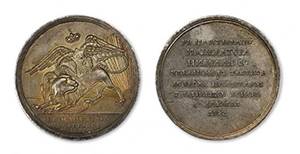
The following year, the actions of the Caucasian army were also successful - the offensive of the Russian army continued, and the culmination of the campaign was the capture of the capital of Anatolia, Erzerum. For his capture, Paskevich was awarded the Order of St. George, First Class. The war with Turkey ended with the signing of the Peace of Adrianople, and on the day of its signing, 22 in September 1829, Ivan received the rank of Field Marshal.
It did not take long to rest on our laurels — Nicholas I assigned Paskevich a new difficult task. It was necessary to carry out the conquest of the mountain peoples who inhabited the Caucasus Mountains. Most of the following, 1830 year, the Field Marshal was engaged in this troublesome and difficult process. However, his activity was characterized not only by military actions - he supported the settlement of the land by the Russians; in Tiflis, at his request, a gymnasium and the institute of noble maidens were founded. He also stood at the base of the newspaper Tiflis Vedomosti. The climate of the Caucasus did not have a very favorable effect on Paskevich - at the end of 1830, he fell ill and asked the emperor to appoint him somewhere else. And there was such a place. In November, an uprising broke out in Warsaw in 1830, which soon covered the whole Kingdom of Poland.
Again in the west
The Kingdom of Poland, which was part of Russia, enjoyed freedoms unprecedented for the rest of the empire. A constitution operated on its territory, a Polish Sejm worked. A large number of military units stationed in the Kingdom of Poland consisted of ethnic Poles, and they were commanded by officers and generals, many of whom fought in the Napoleonic army. Traditional small parties, where high-noble pans found out the relationship between themselves with the help of their private armies, more like gangs, it seemed to be a thing of the past. But the local intelligentsia and military units, obviously, this was not enough.
Back in 20-s. All sorts of circles and societies are beginning to form, the purpose of which was to recreate the Commonwealth from sea to sea. There were alarming signals from the Kingdom of Poland, but the governor there, Grand Duke Constantine, did not attach importance to the rise in temperature in the Polish cauldron, so that sooner or later it had to explode. 1830 was typical for Europe with a sharp increase in revolutionary activity, and the Poles decided that their time had come. The insurgency began in Warsaw with a speech by Polish troops on the night of 17 on November 18. Due to the apparent inconsistency of the position of Constantine, his tendency toward liberalism and unwillingness to make strong-willed decisions, the Russian garrison, quite numerous, left Warsaw on November 9, while the governor, not wanting bloodshed, actually left the Polish rebels. The Poles in joy created a provisional government and began frantically shouting about freedom.
To suppress the rebellion, an army was created under the command of Field Marshal Dibich, who was able to push the Poles back to the Vistula and inflicted a series of defeats on them. However, Dibich himself soon died of cholera in Pułtusk, and in June 1831, Paskevich took his place. Soon the Polish army was pushed aside towards Warsaw, and by August 1831 the capital of the rebels was surrounded by the 85-thousandth Russian army. The city was heavily fortified - the Poles were engaged in defensive works since the spring of 1831. Not wanting extra bloodshed, Paskevich offered to surrender the besieged in exchange for amnesty, but was expectedly refused.
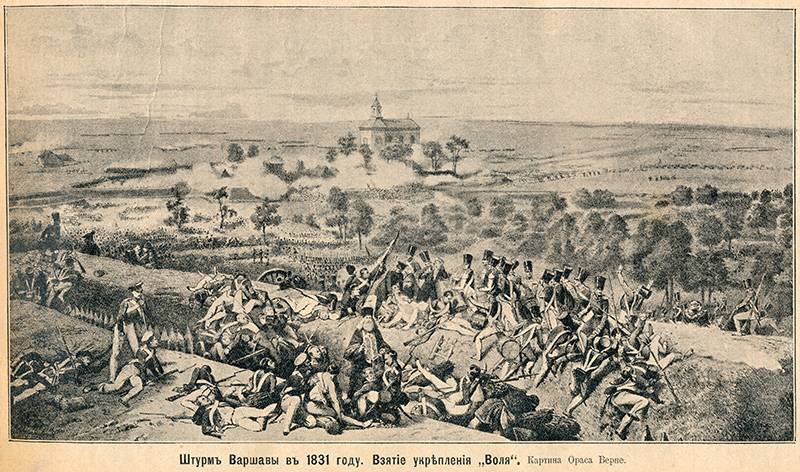
25 August began the assault on Warsaw, and after two days of desperate battles, the commander of the Polish troops, General Kryukovetsky, told through the parliamentarians that the city "obeys the will of the legitimate government." During the battle, Paskevich was contused by the close-flying core, and Grand Duke Mikhail took over command. The grandson of Suvorov was sent to Petersburg with a brief report: “Warsaw is at the feet of Your Imperial Majesty.” Such a turn, echoing the famous Suvorov report of Catherine II, Nicholas I liked it, and Paskevich was elevated to the princely dignity with the name Warsaw and the title of the Most Serene.
After the fall of Warsaw, the rebellion began to fade rapidly, and by October 1831, the fighting was over. The emperor appoints Paskevich as governor of Poland and at the same time commander of all troops stationed there. Unlike its predecessor, field marshal was active in his post. The strengthening of the region first began - fortresses were erected in Warsaw, Ivangorod and Novogeorgievsk. Much attention was paid to the improvement of the police apparatus and the institute of investigation. An active struggle was waged against the Polish liberal underground; however, Paskevich did not show any excessive cruelty here, preferring to use not a gallows, but a link to Siberia. In many ways, precisely because of these preventive actions in the new peak of the European revolutionary activity that occurred in 1848, Poland turned out to be a generally calm region.
However, the field marshal was again in demand in the military field. The holy union, the beloved child of Alexander I, was already a frank anachronism that survived its century, however, when the formally allied Austria ignited the flames of the Hungarian uprising, Nicholas I considered it his duty to give full support to the young emperor Franz Joseph, who was faced with a direct prospect of collapse own empire. To assist in the establishment of order, the Russian army was allocated, and Paskevich was appointed to command it. In June, 1849, he headed the troops entrusted to him entered the territory of Hungary. This proved to be a decisive factor in suppressing the uprising: after suffering a series of defeats, the Hungarians were forced to lay down their arms. Paskevich acted very carefully and unhurriedly in the short-term campaign, trying to keep his strength in one fist. The Prussian king and the Austrian emperor granted him field marshal's ranks of his armies, and Nicholas I ordered royal honors to the “commander father”. Subsequently, Franz Joseph "gratefully" repaid Nicholas for his help - during the Crimean War, Austria took a position hostile to Russia, pulling troops to the borders.
For a short period, Paskevich returned to the administration of the Kingdom of Poland, but in 1853 Russia entered a new war, soon named the Crimean one. Paskevich was summoned to the Danube in the army, where he arrived in April 1854 of the year. He criticized the rather bold and very realistic campaign plan proposed by Nicholas I: to force the Balkan Mountains and strike directly at the capital of the Ottoman Empire, as in the 1828 – 1829 war. However, Paskevich dissuaded the emperor from such bold designs, and the efforts of the army were directed primarily to the capture of numerous Turkish fortresses, especially one of the most powerful - Silistra. Taking command of Prince Gorchakov over the Danube army, Paskevich began to carry out his cautious plans.
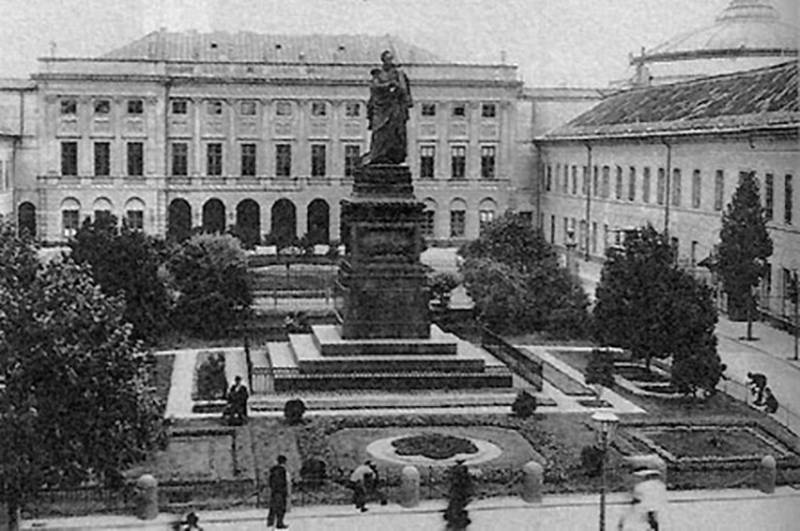
This time, the military fortune did not show its usual favor with Ivan Fedorovich - during the reconnaissance of the Turkish positions at Silistria 24 in May 1854, he was seriously contused with the core. Having passed the command of Gorchakov, the field marshal went to his estate in Gomel for a health amendment, which had begun to fade. The last injury had a strong effect on the state of an already elderly commander. The news of the death of Nicholas I and the fall of Sevastopol finally finished him off. He briefly outlived his emperor, who was his friend, and passed away on 1 on February 1856. His ashes found their last rest in Gomel. Ivan Fyodorovich Paskevich is the only full holder of two orders in the entire history of the Russian army - St. George and St. Vladimir. The monument to Paskevich, installed in 1870 in Warsaw, was destroyed at the initiative of the German occupation authorities in 1917. This is the story of the life of the Little Russian nobleman, a descendant of the Cossacks of the Poltava Regiment, a tireless commander and loyal friend.
Information